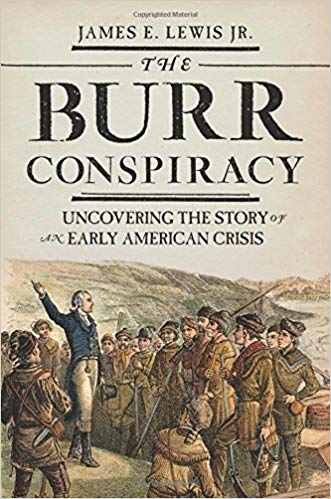 This week at In The Past Lane, the history podcast, I speak with historian James E. Lewis, Jr. about his book, The Burr Conspiracy: Uncovering the Story of an Early American Crisis. Most people these days know that Aaron Burr was, as his character says in Hamilton, The Musical, “the damn fool” who in 1804 shot and killed Alexander Hamilton.
This week at In The Past Lane, the history podcast, I speak with historian James E. Lewis, Jr. about his book, The Burr Conspiracy: Uncovering the Story of an Early American Crisis. Most people these days know that Aaron Burr was, as his character says in Hamilton, The Musical, “the damn fool” who in 1804 shot and killed Alexander Hamilton.
More specifically, Burr was the sitting VP who shot a former Secretary of the Treasury in a duel resulting from a personal feud. Think about it. That’s the equivalent of VP Mike Pence killing former Secretary of the Treasury Tim Geitner or Jack Lew.
But amazingly, Burr went back to Washington DC and finished out his term, leaving office in March 1805.
One of the statements by Hamilton about Burr that contributed to their feud and duel was Hamilton’s warning that Burr had no morals and was a man driven by pure ambition.
To one friend he wrote:
“As to Burr there is nothing in his favour. His private character is not defended by his most partial friends. He is bankrupt beyond redemption except by the plunder of his country. His public principles have no other spring or aim than his own aggrandizement…. If he can, he will certainly disturb our institutions to secure to himself permanent power and with it wealth. He is truly the Cataline of America.”
Hamilton later wrote to another friend that Burr’s ambition for power was boundless. He was, said Hamilton, “sanguine enough to hope everything – daring enough to attempt everything – wicked enough to scruple nothing”
 Was Hamilton right? Was Burr a power hungry demon?
Was Hamilton right? Was Burr a power hungry demon?
Well, his critics would say yes. And for evidence, they’d point to not only his killing of Hamilton, his chief political rival, but also the bizarre plot he got involved in just months after leaving office in 1805. To this day, scholars are divided in their assessment of just what Aaron Burr was up to in 1806 – 1807. Burr headed out to the recently acquired Louisiana purchase territory and begin recruiting men and building ships for some sort of expedition. Some evidence suggests Burr was planning to launch a military campaign to seize a chunk of the lower half of the LP, plus Spanish Mexico, whereupon he would declare it an independent nation with himself as its leader. Other evidence indicates that Burr was floating variations on this scheme by British officials, urging them to support it. And there’s ample evidence that this scheme also had the backing of General James Wilkinson, the highest-ranking officer in the U.S.
For his part, Burr claimed he was merely assembling men and equipment to establish a colony in the new territory.
 In any case, as we will hear in my conversation with historian James E. Lewis Jr., the significance of the alleged Burr conspiracy is not that it existed, but that people believed it did. As a result, the Burr conspiracy constituted a major crisis in the early republic, one that suggested the young and fragile American experiment was on the verge of collapse. This incident is a vivid reminder of just how dicey things were for the United States in its earliest days. If you remember my interview with Carol Berkin in episode 28 of ITPL, the 1790s were marked by bitter political feuding, vicious partisan media, and social unrest that nearly plunged the young nation into civil war. Then in 1804, Burr killed Hamilton. Then just a few years later, the alleged Burr conspiracy was uncovered. Five years later, in 1812, the US went to war against Great Britain for a second time. Two years later, 1814, the British attacked Washington DC and burned the White House.
In any case, as we will hear in my conversation with historian James E. Lewis Jr., the significance of the alleged Burr conspiracy is not that it existed, but that people believed it did. As a result, the Burr conspiracy constituted a major crisis in the early republic, one that suggested the young and fragile American experiment was on the verge of collapse. This incident is a vivid reminder of just how dicey things were for the United States in its earliest days. If you remember my interview with Carol Berkin in episode 28 of ITPL, the 1790s were marked by bitter political feuding, vicious partisan media, and social unrest that nearly plunged the young nation into civil war. Then in 1804, Burr killed Hamilton. Then just a few years later, the alleged Burr conspiracy was uncovered. Five years later, in 1812, the US went to war against Great Britain for a second time. Two years later, 1814, the British attacked Washington DC and burned the White House.
It’s worth keeping these incidents in mind when we think about the early Republic. The founders may have set up a remarkable political system based on the Constitution, but there was no guarantee that it would succeed. Indeed, the founders were keenly aware that all previous attempts at republican government had failed. This historical awareness, plus the context of near constant political turmoil, made the crisis of the Burr conspiracy of 1806-1807 an alarming and consequential event.
Follow In The Past Lane on
Twitter
@InThePastLane
Instagram
@InThePastLane
Facebook
https://www.facebook.com/InThePastLanePodcast/
YouTube
https://www.youtube.com/channel/UCeZMGFqoAASwvSJ1cpZOEAA
Music for This Episode
Jay Graham, ITPL Intro (JayGMusic.com)
Kevin McCleod, “Impact Moderato” (Free Music Archive)
Andy Cohen, “Trophy Endorphins” (Free Music Archive)
The Womb, “I Hope It Hurts” (Free Music Archive)
Blue Dot Sessions, “Sage the Hunter,” (Free Music Archive)
Jon Luc Hefferman, “Winter Trek” (Free Music Archive)
The Bell, “I Am History” (Free Music Archive)
Production Credits
Executive Producer: Lulu Spencer
Technical Advisors: Holly Hunt and Jesse Anderson
Podcasting Consultant: Dave Jackson of the School of Podcasting
Photographer: John Buckingham
Graphic Designer: Maggie Cellucci
Website by: ERI Design
Legal services: Tippecanoe and Tyler Too
Social Media management: The Pony Express
Risk Assessment: Little Big Horn Associates
Growth strategies: 54 40 or Fight
© In The Past Lane, 2018
Recommended History Podcasts
Ben Franklin’s World with Liz Covart @LizCovart
The Age of Jackson Podcast @AgeofJacksonPod
Backstory podcast – the history behind today’s headlines @BackstoryRadio
Past Present podcast with Nicole Hemmer, Neil J. Young, and Natalia Petrzela @PastPresentPod
99 Percent Invisible with Roman Mars @99piorg
Slow Burn podcast about Watergate with @leoncrawl
The Memory Palace – with Nate DiMeo, story teller extraordinaire @thememorypalace
The Conspirators – creepy true crime stories from the American past @Conspiratorcast
The History Chicks podcast @Thehistorychix
My History Can Beat Up Your Politics @myhist
Professor Buzzkill podcast – Prof B takes on myths about the past @buzzkillprof
Footnoting History podcast @HistoryFootnote
The History Author Show podcast @HistoryDean
More Perfect podcast – the history of key US Supreme Court cases @Radiolab
Revisionist History with Malcolm Gladwell @Gladwell
Radio Diaries with Joe Richman @RadioDiaries
DIG history podcast @dig_history
The Story Behind – the hidden histories of everyday things @StoryBehindPod
Studio 360 with Kurt Andersen – specifically its American Icons series @Studio360show
Uncivil podcast – fascinating takes on the legacy of the Civil War in contemporary US @uncivilshow
Stuff You Missed in History Class @MissedinHistory
The Whiskey Rebellion – two historians discuss topics from today’s news @WhiskeyRebelPod
American History Tellers @ahtellers
The Way of Improvement Leads Home with historian John Fea @JohnFea
The Bowery Boys podcast – all things NYC history @BoweryBoys
Ridiculous History @RidiculousHSW
The Rogue Historian podcast with historian @MKeithHarris
The Road To Now podcast @Road_To_Now
Retropod with @mikerosenwald
